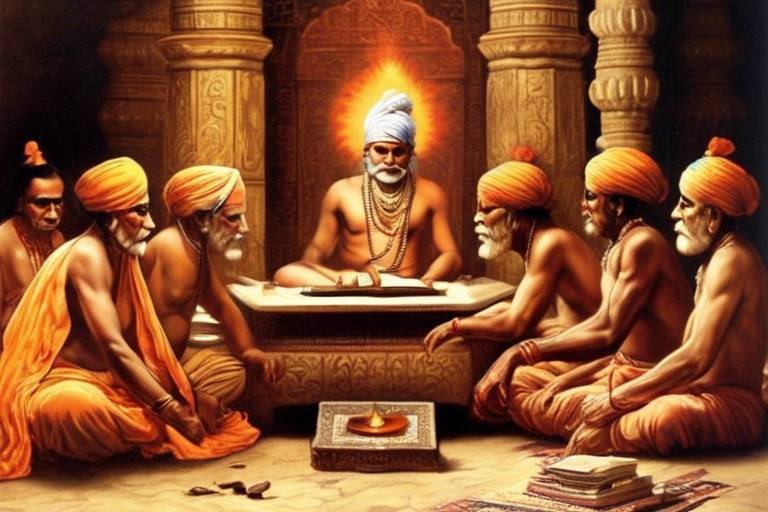Indian Philosophy - Its Significance and Influence
Indian philosophy is a vast and intricate tapestry that weaves together the thoughts, beliefs, and practices of a civilization that dates back thousands of years. It is not merely a collection of ideas; rather, it represents a profound exploration of existence, consciousness, and the universe. The significance of Indian philosophy lies in its ability to address fundamental questions about life, ethics, and the nature of reality, making it a cornerstone of not just Indian culture but also a significant contributor to global philosophical discourse.
At its core, Indian philosophy invites us to ponder questions like: What is the nature of the self? How do we achieve true happiness? What is our duty in this world? These inquiries resonate deeply, transcending cultural and geographical boundaries. The teachings of Indian philosophy have influenced various fields such as spirituality, psychology, and even modern science, showcasing their relevance in contemporary society.
Moreover, Indian philosophy is characterized by its diversity. From the ancient Vedas to the teachings of the Buddha, and from the intricate analyses of the Upanishads to the ethical frameworks of Jainism, each school offers unique perspectives that enrich our understanding of existence. This rich intellectual heritage not only fosters a sense of identity among practitioners but also encourages dialogue and synthesis with other philosophical traditions.
Indian philosophy is also deeply practical. It is not merely theoretical; it provides guidance on how to live a fulfilling life. Concepts such as Dharma (duty), Karma (action and consequence), and Ahimsa (non-violence) form the bedrock of ethical living in Indian culture. These ideas resonate with many people today, as they seek to navigate the complexities of modern life while remaining grounded in ethical principles.
In summary, the significance of Indian philosophy extends far beyond its historical roots. It continues to inspire and influence individuals and societies around the world, offering profound insights into the nature of existence and our place within it. As we delve deeper into the various schools of thought and their implications, we begin to appreciate the profound influence that Indian philosophy has had, and continues to have, on global thought and practice.
- What are the main schools of Indian philosophy? The primary schools include Vedanta, Samkhya, Buddhism, and Jainism, each providing unique insights into existence and ethics.
- How does Indian philosophy influence modern thought? Indian philosophy has significantly impacted areas such as psychology, spirituality, and environmental ethics, promoting holistic approaches to contemporary issues.
- What role does Dharma play in Indian philosophy? Dharma is central to ethical conduct and social order, guiding individuals in their responsibilities towards themselves and society.
- Can Indian philosophy be applied to everyday life? Absolutely! Concepts like Karma and Ahimsa can help individuals make ethical decisions and cultivate a sense of responsibility in their daily lives.

Historical Overview
This article explores the rich tapestry of Indian philosophy, its historical roots, key concepts, and profound impact on various disciplines, shedding light on its relevance in contemporary society.
Indian philosophy boasts a rich and diverse history that spans thousands of years, intertwining with the cultural, spiritual, and intellectual fabric of the subcontinent. Its origins can be traced back to the ancient Vedic texts, which laid the groundwork for various philosophical inquiries and reflections. The Vedas, composed around 1500 BCE, introduced foundational concepts such as Brahman (the ultimate reality) and Atman (the individual soul), setting the stage for subsequent philosophical exploration.
As we delve deeper into the historical timeline, we can identify several key periods that shaped the evolution of Indian thought:
| Period | Key Developments | Influential Thinkers |
|---|---|---|
| Vedic Period (1500 - 500 BCE) | Formation of the Vedas and Upanishads | Vyasa, Yajnavalkya |
| Classical Period (500 BCE - 500 CE) | Rise of major philosophical schools | Gautama Buddha, Mahavira |
| Medieval Period (500 - 1700 CE) | Integration of philosophy with religion | Adi Shankaracharya, Ramanuja |
| Modern Period (1700 - Present) | Interaction with Western thought | Swami Vivekananda, Sri Aurobindo |
During the Classical Period, we witness the emergence of significant philosophical schools such as Vedanta, Samkhya, Buddhism, and Jainism. Each of these traditions offered unique perspectives on existence, ethics, and the nature of reality. For instance, Buddhism, founded by Gautama Buddha, emphasized the path to enlightenment through understanding the nature of suffering, while Jainism, established by Mahavira, championed the principles of non-violence and truth.
As we transition into the Medieval Period, Indian philosophy began to intertwine more closely with religious practices. Thinkers like Adi Shankaracharya and Ramanuja engaged in profound debates about the nature of reality and the relationship between the individual soul and the divine. Their contributions not only shaped philosophical discourse but also influenced devotional practices across the Indian subcontinent.
In the Modern Period, Indian philosophy encountered Western thought, leading to a rich dialogue that further enriched its landscape. Visionaries like Swami Vivekananda brought Indian philosophical concepts to the global stage, emphasizing their relevance in addressing universal human concerns. This period marked a significant transformation, as Indian philosophy began to influence various fields, including psychology, science, and spirituality.
Throughout its history, Indian philosophy has demonstrated a remarkable ability to adapt and evolve, responding to the changing needs and contexts of society. Its teachings continue to resonate, offering profound insights into the nature of existence, ethics, and the human experience. In the next sections, we will explore the key philosophical schools that emerged from this historical backdrop, each contributing to the rich dialogue of Indian thought.
- What is the significance of Indian philosophy? Indian philosophy provides deep insights into ethics, existence, and spirituality, influencing various disciplines worldwide.
- Who are some key figures in Indian philosophy? Influential thinkers include Adi Shankaracharya, Gautama Buddha, and Swami Vivekananda.
- How has Indian philosophy impacted modern thought? It has shaped discussions in psychology, science, and spirituality, offering valuable perspectives on contemporary issues.

Key Philosophical Schools
Indian philosophy is a vast and intricate landscape, populated by a multitude of schools that each contribute unique perspectives to the understanding of existence, ethics, and the ultimate nature of reality. These schools, while distinct, often intersect and influence one another, creating a rich dialogue that has persisted for centuries. In this section, we will explore some of the most significant philosophical schools in Indian thought, including Vedanta, Samkhya, Buddhism, and Jainism. Each of these schools offers a different lens through which to view the world and our place within it.
Vedanta stands out as one of the most influential schools, rooted in the teachings of the Upanishads. It emphasizes the concept of Brahman, the ultimate reality, and delves into the relationship between the individual soul (Atman) and this supreme consciousness. Vedanta is further divided into various sub-schools, including Advaita Vedanta, which advocates for non-dualism, and Vishishtadvaita Vedanta, which introduces a qualified non-dualism perspective that acknowledges the individual soul's unique relationship with the divine.
Next, we have Samkhya, one of the oldest philosophical systems that outlines a dualistic framework of reality, dividing existence into Purusha (consciousness) and Prakriti (matter). This school is pivotal in understanding the interplay between the mind and the physical world, influencing various aspects of yoga and meditation practices.
Then comes Buddhism, which revolutionized Indian thought with its focus on the nature of suffering and the path to enlightenment. Central to Buddhist philosophy are the Four Noble Truths and the Eightfold Path, which serve as a guide for ethical living and mental discipline. The emphasis on mindfulness and compassion has resonated far beyond its origins, impacting various global spiritual practices.
Finally, we cannot overlook Jainism, which shares some commonalities with Buddhism but is distinct in its rigorous ethical framework, particularly the principle of Ahimsa (non-violence). Jain philosophy advocates for a path of strict non-violence and truth, influencing not only religious practices but also social and environmental ethics in contemporary society.
In summary, the key philosophical schools of Indian thought provide a diverse array of insights into the human experience. They challenge us to question our beliefs, understand our actions, and ultimately seek a deeper connection with the universe. Each school contributes to the rich tapestry of Indian philosophy, inviting us to explore the profound questions of existence and our place within it.
- What is the significance of Indian philosophy?
Indian philosophy offers profound insights into ethics, existence, and the nature of reality, influencing various disciplines and cultures worldwide. - How do the schools of Indian philosophy differ?
Each school presents unique perspectives; for example, Vedanta focuses on the unity of the soul with the ultimate reality, while Buddhism emphasizes understanding suffering and achieving enlightenment. - Can Indian philosophy be applied in modern contexts?
Absolutely! Concepts like mindfulness from Buddhism and the ethical principles of Jainism are increasingly relevant in today’s discussions on wellness and environmental ethics.

Vedanta Philosophy
Vedanta, one of the most prominent schools of Indian philosophy, is a fascinating exploration of existence, reality, and the ultimate purpose of life. Rooted in the teachings of the Upanishads, Vedanta literally means "the end of the Vedas," which signifies its position as the culmination of Vedic thought. This philosophical framework delves deep into the nature of the self, the universe, and the relationship between the two. At its core, Vedanta posits that the ultimate reality, referred to as Brahman, is the source of all existence and consciousness. This concept invites us to ponder profound questions: What is the nature of reality? Who are we in the grand scheme of things?
One of the most intriguing aspects of Vedanta is its emphasis on self-realization. It teaches that the individual self, or Atman, is not separate from Brahman but is, in fact, a reflection of it. This notion of non-duality is what makes Vedanta particularly captivating. Imagine looking into a mirror and seeing not just your reflection but the entire universe within it. This metaphor illustrates the idea that understanding our true nature can lead us to a deeper comprehension of the cosmos itself.
Vedanta is not just a philosophical framework; it is also a path for spiritual practice. The teachings encourage meditation and introspection, allowing individuals to experience the oneness of existence firsthand. This journey of self-discovery is not merely an intellectual exercise; it is a transformative process that can lead to liberation, or Moksha. Moksha represents the ultimate goal of human life—freedom from the cycle of birth and rebirth, often referred to as Samsara.
Within the Vedanta tradition, there are several interpretations, each offering unique insights. The three primary schools are:
- Advaita Vedanta: This non-dualistic approach, championed by the philosopher Adi Shankaracharya, asserts that the individual soul and the ultimate reality are one and the same. It emphasizes the illusory nature of the material world and the importance of realizing our true self.
- Vishishtadvaita Vedanta: Founded by Ramanuja, this school proposes a qualified non-dualism, suggesting that while the individual soul is distinct from Brahman, it is also inseparably connected to it. This perspective encourages a devotional approach to spirituality.
- Advaya Vedanta: A lesser-known yet significant viewpoint, it emphasizes the non-duality of consciousness and its relation to the material world, promoting a more holistic understanding of existence.
The teachings of Vedanta have profoundly influenced various aspects of Indian culture, including art, literature, and spirituality. Many contemporary spiritual leaders, such as Swami Vivekananda and Paramahansa Yogananda, have drawn upon Vedantic principles to inspire millions worldwide. Their teachings resonate with the idea that self-realization is not just a personal journey but a universal quest for truth and connection.
In conclusion, Vedanta philosophy serves as a bridge between the individual and the universal, inviting us to explore the depths of our being and the vastness of existence. Its teachings challenge us to look beyond the surface and recognize the interconnectedness of all life. As we navigate through the complexities of modern society, the insights offered by Vedanta remain as relevant as ever, encouraging us to seek harmony within ourselves and the world around us.
- What is the main idea of Vedanta? Vedanta focuses on understanding the nature of reality, the self, and the relationship between the two, emphasizing that the individual soul (Atman) is ultimately one with the universal soul (Brahman).
- How does Vedanta differ from other philosophies? Unlike many Western philosophies that may emphasize dualism, Vedanta promotes non-dualism, suggesting that all existence is interconnected and that realizing this connection is key to spiritual liberation.
- Can Vedanta be practiced in daily life? Absolutely! The principles of Vedanta can be integrated into daily practices, such as meditation, self-reflection, and ethical living, to foster a deeper understanding of oneself and one’s place in the universe.

Advaita Vedanta
Advaita Vedanta, a profound and intricate school of Indian philosophy, emphasizes the concept of non-dualism, suggesting that the ultimate reality, known as Brahman, is singular and all-encompassing. This philosophical perspective posits that the individual soul, or Atman, is not separate from Brahman but is, in fact, one with it. Imagine standing in front of a vast ocean; while you may see waves rising and falling, beneath the surface, there exists a single body of water. This analogy captures the essence of Advaita Vedanta, where the apparent differences in the world are merely illusions, or Maya, masking the underlying unity of existence.
The teachings of Advaita Vedanta are primarily derived from the Upanishads, ancient texts that explore the nature of reality and the self. One of the most notable philosophers associated with this tradition is Adi Shankaracharya, who played a pivotal role in articulating and systematizing these ideas in the 8th century CE. He traveled extensively across India, engaging in debates and discussions, and established monastic centers that continue to thrive today. Shankaracharya's commentaries on the Upanishads and the Brahma Sutras remain foundational texts for anyone wishing to delve deeper into this philosophy.
Advaita Vedanta's core teachings can be summarized in a few key principles:
- Non-Duality: The belief that there is no real separation between the individual and the universal self.
- Self-Realization: The journey towards understanding one's true nature as Atman, which ultimately leads to liberation or Moksha.
- Illusion of the Material World: The material world is seen as an illusion that distracts individuals from realizing their unity with Brahman.
One of the most significant implications of Advaita Vedanta is its approach to spiritual practices. Unlike some traditions that emphasize rituals and external worship, Advaita Vedanta focuses on introspection and self-inquiry. The famous question, "Who am I?" serves as a central tenet in this contemplative practice. By exploring this question deeply, practitioners aim to peel away the layers of identity shaped by societal norms and personal experiences, ultimately revealing their true nature.
Moreover, Advaita Vedanta has transcended its historical roots to influence various aspects of contemporary spirituality and psychology. Modern thinkers and spiritual leaders often draw upon its teachings to promote a sense of interconnectedness and holistic understanding of life. This philosophy encourages individuals to look beyond the superficial differences that separate us, fostering a more compassionate and inclusive worldview.
In summary, Advaita Vedanta offers a transformative perspective on reality that challenges us to rethink our understanding of self and existence. Its emphasis on non-duality invites us to explore the depths of our consciousness, ultimately leading to a profound realization of our unity with the cosmos. As we navigate the complexities of modern life, the teachings of Advaita Vedanta remain a beacon of wisdom, guiding us toward a deeper understanding of ourselves and our place in the universe.
- What is Advaita Vedanta? Advaita Vedanta is a non-dualistic school of Indian philosophy that teaches the oneness of the individual soul (Atman) and the ultimate reality (Brahman).
- Who was Adi Shankaracharya? Adi Shankaracharya was an influential philosopher and theologian who consolidated the teachings of Advaita Vedanta in the 8th century CE.
- How does Advaita Vedanta differ from other philosophical traditions? Unlike dualistic philosophies that emphasize separation between the divine and the individual, Advaita Vedanta teaches that all existence is interconnected and ultimately one.
- What practices are associated with Advaita Vedanta? Practices include self-inquiry, meditation, and contemplation on the nature of the self, often centered around the question "Who am I?".

Vishishtadvaita Vedanta
Vishishtadvaita Vedanta, often referred to as "qualified non-dualism," presents a fascinating perspective within the broader spectrum of Indian philosophy. Developed by the renowned philosopher Ramanuja in the 11th century, this school of thought emphasizes the relationship between the individual soul (jiva) and the ultimate reality (Brahman) as a harmonious and distinct connection rather than a complete merger. In other words, while the individual soul is part of the divine, it retains its unique identity and characteristics. This nuanced understanding sets Vishishtadvaita apart from its more extreme counterpart, Advaita Vedanta, which posits a strict non-dualism where individuality dissolves into the universal essence.
One of the core teachings of Vishishtadvaita is the concept of Brahman as a personal God, often identified with Vishnu. This personal aspect of the divine allows devotees to cultivate a loving relationship with God, fostering a sense of devotion (bhakti) that is central to this philosophical framework. Unlike in Advaita, where the focus is on intellectual realization, Vishishtadvaita encourages emotional engagement, making spirituality accessible and relatable to the average person. This approach has significantly influenced various devotional movements across India, promoting practices that emphasize love, surrender, and service to God.
To illustrate the key tenets of Vishishtadvaita Vedanta, consider the following table that contrasts it with Advaita Vedanta:
| Aspect | Vishishtadvaita Vedanta | Advaita Vedanta |
|---|---|---|
| Nature of Reality | Qualified non-dualism; individual souls are distinct yet part of Brahman | Non-dualism; individual souls are ultimately identical to Brahman |
| Concept of God | Personal God (Vishnu) with distinct attributes | Impersonal, formless ultimate reality |
| Path to Liberation | Devotion (bhakti) and surrender to God | Knowledge (jnana) and realization of non-duality |
| Role of Individual | Retains individuality; relationship with God is essential | Individuality is an illusion; realization of oneness is key |
The teachings of Vishishtadvaita also emphasize the importance of bhakti or devotion, which is seen as a vital path to attain liberation (moksha). This devotion is not merely an emotional experience but is intricately linked with ethical living and social responsibility. Followers are encouraged to live a life of righteousness (dharma), which aligns with the divine will. This ethical framework fosters a sense of community and interconnectedness among individuals, further enriching the philosophical landscape of India.
In contemporary society, the principles of Vishishtadvaita Vedanta continue to resonate. Many people find solace in the idea of a personal God who listens, cares, and interacts with them. This accessibility of spirituality encourages individuals to engage in practices that cultivate peace, compassion, and understanding, making it relevant in today's fast-paced world. Ultimately, Vishishtadvaita Vedanta serves as a bridge, connecting the timeless wisdom of ancient philosophy with the modern quest for meaning and purpose.
- What is the main difference between Vishishtadvaita and Advaita Vedanta? Vishishtadvaita emphasizes a personal relationship with God and the individuality of souls, while Advaita Vedanta focuses on the non-dual nature of reality where individuality is seen as an illusion.
- Who is the founder of Vishishtadvaita Vedanta? The school was founded by the philosopher Ramanuja in the 11th century.
- How does Vishishtadvaita influence modern spirituality? Its emphasis on devotion and personal connection to God resonates with many contemporary spiritual seekers, encouraging ethical living and community engagement.

Buddhist Philosophy
Buddhist philosophy is a profound and intricate system of thought that revolves around the understanding of the nature of reality, suffering, and the path to enlightenment. At its core, it emphasizes the importance of personal experience and introspection rather than blind faith. This approach invites individuals to explore their own minds and experiences, leading to a deeper understanding of existence. Central to Buddhist philosophy are the Four Noble Truths, which serve as a guiding framework for understanding the human condition.
The Four Noble Truths are as follows:
- The Truth of Suffering (Dukkha): Life is inherently filled with suffering, from the mundane to the profound.
- The Truth of the Cause of Suffering (Samudaya): Suffering arises from attachment, desire, and ignorance.
- The Truth of the End of Suffering (Nirodha): It is possible to end suffering by overcoming attachment and desire.
- The Truth of the Path to the End of Suffering (Magga): The Eightfold Path provides a practical guide to achieving this liberation.
The Eightfold Path is a comprehensive guide that consists of eight interrelated practices aimed at cultivating ethical conduct, mental discipline, and wisdom. These practices include:
- Right Understanding: Comprehending the nature of reality and the Four Noble Truths.
- Right Intent: Cultivating an attitude of compassion and renunciation.
- Right Speech: Engaging in truthful and harmonious communication.
- Right Action: Acting ethically and avoiding harm to others.
- Right Livelihood: Choosing a profession that does not harm others.
- Right Effort: Cultivating positive states of mind.
- Right Mindfulness: Developing awareness of the body, feelings, and mental states.
- Right Concentration: Practicing meditation to achieve mental focus.
Another significant aspect of Buddhist philosophy is the concept of dependent origination, which asserts that all phenomena arise in dependence upon conditions and are thus impermanent. This idea encourages a deep understanding of the interconnectedness of all things, fostering a sense of compassion and empathy towards others. It challenges the notion of a permanent self, promoting the idea that our identities are fluid and shaped by our experiences and interactions.
Buddhist philosophy also places great emphasis on mindfulness and meditation as essential tools for personal transformation. Through practices such as meditation, individuals can cultivate a state of awareness that allows them to observe their thoughts and feelings without attachment, leading to greater clarity and insight. This practice is not just about achieving a tranquil mind; it's about understanding the very nature of existence and our place within it.
In summary, Buddhist philosophy offers a rich and nuanced perspective on life, suffering, and the quest for enlightenment. Its teachings encourage individuals to engage deeply with their own experiences and foster a compassionate approach to existence. By understanding the core principles of Buddhism, one can embark on a transformative journey towards greater awareness and peace.
1. What are the main teachings of Buddhism?
Buddhism teaches the Four Noble Truths and the Eightfold Path, focusing on the nature of suffering and the path to enlightenment.
2. How does meditation fit into Buddhist philosophy?
Meditation is a core practice in Buddhism that helps cultivate mindfulness, clarity, and insight into the nature of reality.
3. What is the significance of compassion in Buddhism?
Compassion is central to Buddhist philosophy, as it encourages empathy and understanding towards all living beings, recognizing our interconnectedness.
4. How does Buddhist philosophy address the concept of self?
Buddhist philosophy challenges the notion of a permanent self, suggesting that our identities are shaped by our experiences and interactions.

Ethics in Indian Philosophy
When we dive into the realm of Indian philosophy, one of the most fascinating aspects that emerges is its rich tapestry of ethical frameworks. These frameworks are not just abstract concepts; they are deeply intertwined with the fabric of daily life, guiding actions, shaping societal norms, and influencing individual conduct. Central to this ethical discourse are three pivotal concepts: Dharma, Karma, and Ahimsa. Each of these principles plays a crucial role in understanding morality and social responsibility within the Indian philosophical tradition.
Dharma, often translated as duty or righteousness, serves as a moral compass for individuals. It encompasses a wide range of responsibilities, not just to oneself but also to family, community, and the cosmos. In essence, Dharma is about maintaining social order and harmony. Imagine a well-tuned orchestra, where each musician plays their part in harmony with others; this is akin to how Dharma operates in society. When individuals adhere to their Dharma, they contribute to the greater good, ensuring that the societal structure remains intact and functional.
On the other hand, Karma introduces a fascinating layer to ethical considerations. The principle of Karma posits that every action has consequences, both immediate and far-reaching. This concept encourages individuals to reflect on their choices and the potential impact on others. It’s like tossing a stone into a pond; the ripples extend far beyond the initial splash. In this way, Karma instills a sense of accountability and responsibility, urging individuals to act with mindfulness and integrity.
Ahimsa, or non-violence, is another cornerstone of Indian ethical thought. This principle extends beyond mere abstention from physical harm; it encompasses thoughts, words, and actions. Ahimsa encourages compassion and empathy towards all living beings, promoting a lifestyle that seeks to minimize harm. It’s a gentle reminder that our interactions with the world should be rooted in love and respect. Think of it as a garden; when we nurture it with care, it flourishes, reflecting the beauty of our intentions.
To encapsulate the essence of these ethical principles, let’s take a closer look at how they interact:
| Ethical Principle | Definition | Impact on Society |
|---|---|---|
| Dharma | Duty and righteousness | Maintains social order and harmony |
| Karma | Action and its consequences | Encourages accountability and mindfulness |
| Ahimsa | Non-violence and compassion | Promotes empathy and respect for all beings |
In summary, the ethical frameworks within Indian philosophy are not just theoretical musings; they are practical guides for living a meaningful and responsible life. By embracing Dharma, understanding Karma, and practicing Ahimsa, individuals can contribute to a more harmonious society. These principles invite us to reflect on our actions and their implications, fostering a culture of responsibility and compassion that resonates deeply within the Indian ethos.
- What is Dharma in Indian philosophy?
Dharma refers to the moral duties and responsibilities that guide individuals in their actions and decisions, contributing to social order. - How does Karma influence ethical behavior?
Karma emphasizes that every action has consequences, encouraging individuals to act thoughtfully and responsibly. - What is the significance of Ahimsa?
Ahimsa promotes non-violence and compassion towards all living beings, fostering a culture of empathy and respect.

Dharma and Social Order
Dharma, a fundamental concept in Indian philosophy, serves as the backbone of social order and moral conduct. Often translated as "duty" or "righteousness," Dharma encompasses a wide range of ethical responsibilities that individuals owe to themselves, their families, their communities, and the universe at large. It is not merely a set of rules; rather, it is a guiding principle that shapes how one interacts with the world. Imagine Dharma as a compass that helps navigate the complexities of life, ensuring that our actions contribute to the greater good.
In the context of Indian society, Dharma plays a crucial role in maintaining harmony and balance. When individuals adhere to their Dharma, they contribute to a well-ordered society where everyone understands their roles and responsibilities. This understanding fosters cooperation and reduces conflict. For instance, in the traditional caste system, each caste had its own set of duties and responsibilities, which were seen as essential for the overall functioning of society. Although this system has evolved and faced criticism, the essence of Dharma as a guiding principle remains relevant.
Furthermore, Dharma is not static; it evolves with changing social dynamics. What was considered righteous in one era may not hold the same significance in another. This adaptability allows Dharma to resonate with contemporary issues, such as gender equality and environmental stewardship. For example, the modern interpretation of Dharma encourages individuals to advocate for social justice and environmental sustainability, recognizing that our actions today will impact future generations.
One of the most profound aspects of Dharma is its relationship with the concept of Karma. The two are intricately linked, as the actions we take in accordance with our Dharma directly influence our Karma. Good deeds aligned with Dharma lead to positive outcomes, while neglecting our responsibilities can result in negative consequences. This cause-and-effect relationship not only shapes individual lives but also contributes to the collective well-being of society.
To better understand the implications of Dharma on social order, let’s consider a few key points:
- Social Cohesion: Dharma fosters a sense of belonging and unity among individuals, reinforcing the idea that everyone has a role to play.
- Moral Framework: It provides a moral compass, guiding individuals in making ethical decisions that benefit both themselves and their communities.
- Conflict Resolution: By adhering to Dharma, individuals are more likely to resolve conflicts amicably, prioritizing harmony over discord.
In summary, Dharma is not just a concept confined to ancient texts; it is a living philosophy that informs our daily lives and social structures. Its emphasis on duty, responsibility, and ethical living lays the groundwork for a balanced and harmonious society. As we navigate the complexities of modern life, embracing the principles of Dharma can lead to a more just and equitable world.
What is Dharma?
Dharma refers to the ethical duties and responsibilities that individuals have towards themselves and society. It encompasses a wide range of moral principles guiding behavior and decision-making.
How does Dharma influence social order?
Dharma helps maintain social order by providing individuals with a framework for understanding their roles and responsibilities, thereby fostering cooperation and reducing conflict.
Can Dharma change over time?
Yes, Dharma is not static. It evolves with changing societal norms and values, allowing it to remain relevant in addressing contemporary issues.
What is the relationship between Dharma and Karma?
Dharma and Karma are interconnected; actions taken in accordance with Dharma lead to positive Karma, while neglecting one's responsibilities can result in negative consequences.

Karma and Rebirth
The concepts of Karma and rebirth are foundational to Indian philosophy, weaving a complex tapestry that shapes ethical considerations and personal behaviors. At its core, Karma refers to the law of cause and effect, where every action has consequences that ripple through time and space. This isn't just a cosmic ledger keeping track of good and bad deeds; it's a profound understanding that our actions, intentions, and thoughts create a chain reaction that influences our current life and future existences.
To illustrate this, imagine throwing a stone into a still pond. The stone creates ripples that expand outward, affecting everything in its path. Similarly, every action we take sends out ripples into the universe, impacting not only our lives but also the lives of others. This principle encourages individuals to act with mindfulness and intention, fostering a sense of responsibility for one’s actions.
Rebirth, or punarjanma, complements the concept of Karma by suggesting that the soul is eternal and undergoes a cycle of birth, death, and rebirth. This cycle is known as samsara, and it's believed that the conditions of one’s next life are determined by the accumulated Karma of previous lives. In essence, if you lead a life filled with compassion, honesty, and virtue, you're more likely to be reborn into favorable circumstances. Conversely, negative actions can lead to less desirable rebirths.
The interplay between Karma and rebirth emphasizes the importance of ethical living. It encourages individuals to cultivate a lifestyle that promotes Ahimsa (non-violence), truthfulness, and selflessness. This ethical framework is not just a moral guideline; it is a pathway to spiritual liberation, or Moksha, which signifies freedom from the cycle of samsara. The ultimate goal is to transcend the limitations of physical existence and realize one’s true nature, which is often described as Brahman, the ultimate reality.
In practical terms, understanding Karma and rebirth can profoundly influence how we perceive life’s challenges and triumphs. Instead of viewing hardships as mere misfortunes, individuals can see them as opportunities for growth and learning, shaped by their past actions. This perspective fosters resilience and a proactive approach to life, encouraging individuals to reflect on their choices and strive for positive change.
In summary, the concepts of Karma and rebirth offer a rich philosophical framework that not only provides insights into the nature of existence but also serves as a guide for ethical living. By understanding these principles, individuals can navigate life with greater awareness and intention, ultimately leading to a more harmonious existence.
- What is Karma? Karma is the law of cause and effect, where every action has consequences that influence future experiences.
- How does rebirth work? Rebirth is the cycle of birth, death, and reincarnation, where the soul is believed to take on new forms based on accumulated Karma.
- Can Karma be changed? Yes, individuals can change their Karma through conscious actions and intentions, leading to positive outcomes in this and future lives.
- What role does Dharma play in Karma? Dharma refers to the moral and ethical duties one must follow, and living according to Dharma helps create positive Karma.

Influence on Global Thought
Indian philosophy has transcended its geographical boundaries, weaving its intricate threads into the fabric of global thought. This influence is not merely a ripple; it's more akin to a tidal wave that has shaped various disciplines, including philosophy, spirituality, psychology, and even modern science. The essence of Indian philosophical traditions resonates with universal themes of existence, morality, and the nature of reality, making it relevant across cultures and eras.
One of the most profound impacts of Indian philosophy is its approach to spirituality and self-realization. Thinkers like Swami Vivekananda and Rudolf Steiner have introduced concepts such as yoga and meditation to the Western world, promoting a holistic approach to well-being. This has led to a significant shift in how we view mental health and personal development. The integration of mindfulness practices, derived from Buddhist philosophy, has become a cornerstone in modern psychology, emphasizing the importance of being present and aware in our daily lives.
Moreover, Indian philosophical schools, particularly Buddhism, have contributed significantly to ethical discussions in the West. The Four Noble Truths and the Eightfold Path offer a structured way to understand suffering and the human condition, influencing various movements and ideologies. For instance, the concept of Ahimsa (non-violence) has inspired global leaders like Mahatma Gandhi and Martin Luther King Jr., who have utilized these principles to advocate for social change and justice.
In the realm of science, Indian philosophy has sparked interest in areas such as quantum physics and consciousness studies. The idea of interconnectedness found in Vedanta philosophy aligns intriguingly with modern scientific discoveries about the universe. This has led to collaborative dialogues between scientists and philosophers, exploring questions about the nature of reality that were once considered purely metaphysical.
To illustrate the breadth of Indian philosophy's influence, let’s take a look at some key areas:
| Area | Influence |
|---|---|
| Spirituality | Introduction of yoga and meditation practices in the West |
| Ethics | Promotion of non-violence and social justice movements |
| Psychology | Integration of mindfulness and self-awareness techniques |
| Science | Exploration of consciousness and interconnectedness |
As we delve deeper into the modern applications of Indian philosophy, it becomes clear that its teachings are not just relics of the past but living doctrines that continue to inspire and guide contemporary thought. The dialogues between Indian and Western philosophies have led to a rich tapestry of ideas that encourage us to rethink our understanding of existence, ethics, and the cosmos.
In conclusion, the influence of Indian philosophy on global thought is a testament to its profound relevance. It challenges us to question our beliefs, embrace our interconnectedness, and pursue a deeper understanding of ourselves and the world around us. As we navigate the complexities of modern life, the wisdom of Indian philosophical traditions serves as a beacon, guiding us toward a more harmonious existence.
- What are the main contributions of Indian philosophy to the world? Indian philosophy has contributed significantly to spirituality, ethics, psychology, and scientific discourse, promoting concepts such as non-violence, mindfulness, and interconnectedness.
- How has Indian philosophy influenced Western thought? Indian philosophy has introduced ideas like yoga and meditation to the West, influenced social justice movements, and sparked discussions in psychology and science regarding consciousness and reality.
- What role does meditation play in Indian philosophy? Meditation is a fundamental practice in Indian philosophy, aimed at achieving self-realization, mental clarity, and spiritual growth, significantly impacting modern wellness practices.

Impact on Western Philosophy
The influence of Indian philosophy on Western thought is a fascinating subject that reveals a rich tapestry of intellectual exchange. Over the centuries, various Indian philosophical concepts have permeated Western philosophy, often leading to profound shifts in understanding the nature of reality, consciousness, and ethics. One of the most notable interactions occurred during the 19th century, when Western thinkers began to explore Eastern philosophies, seeking wisdom beyond their cultural confines.
Key figures such as Ralph Waldo Emerson and Henry David Thoreau were instrumental in introducing Indian philosophical ideas to American audiences. They were particularly drawn to the concepts of non-dualism and the interconnectedness of all beings, which resonated deeply with their transcendentalist beliefs. Emerson’s essays often reflected the influence of Vedanta, while Thoreau’s writings on nature echoed the principles of Ahimsa and environmental ethics found in Indian traditions.
Additionally, the Theosophical Society, founded in the late 19th century, played a significant role in bridging Eastern and Western thought. Leaders like Madame Blavatsky and Henry Steel Olcott promoted the study of Indian philosophy, emphasizing the importance of karma and reincarnation. This movement not only sparked interest in Indian spiritual practices but also encouraged a broader acceptance of Eastern philosophies in the West.
In the realm of psychology, the works of Carl Jung reflect a significant integration of Indian concepts into Western thought. Jung’s exploration of the collective unconscious and archetypes parallels the Indian understanding of universal truths and shared human experiences. His interest in meditation and self-realization drew heavily from Eastern practices, showcasing the profound impact Indian philosophy had on modern psychological theories.
The 20th century saw a further deepening of this dialogue, particularly with the rise of Hinduism and Buddhism in Western societies. Thinkers like Alan Watts and Jiddu Krishnamurti became prominent figures in popularizing Eastern philosophies, offering insights that challenged traditional Western paradigms. Their teachings on mindfulness, presence, and the nature of the self have significantly influenced contemporary spiritual practices and psychological approaches.
Today, the impact of Indian philosophy on Western thought is evident in various disciplines, including ethics, environmentalism, and spirituality. For instance, the concept of Sustainable Living aligns closely with the Indian principle of Ahimsa, advocating for a lifestyle that respects all forms of life. This ethical framework encourages individuals to consider the broader implications of their actions, fostering a sense of responsibility towards the planet and its inhabitants.
In summary, the interplay between Indian and Western philosophies has not only enriched intellectual discourse but has also provided valuable insights into the complexities of human existence. As we continue to navigate the challenges of modern life, the teachings of Indian philosophy offer timeless wisdom that transcends cultural boundaries, inviting us to explore deeper truths about ourselves and our interconnected world.
- What is the main influence of Indian philosophy on Western thought? Indian philosophy has introduced concepts such as non-dualism, karma, and mindfulness, which have transformed Western perspectives on ethics, psychology, and spirituality.
- Who are some key figures in the integration of Indian philosophy into Western thought? Notable figures include Ralph Waldo Emerson, Henry David Thoreau, Carl Jung, Alan Watts, and Jiddu Krishnamurti.
- How has Indian philosophy impacted modern psychology? Indian concepts like meditation and self-realization have influenced therapeutic practices and the understanding of consciousness in psychology.
- What role does Indian philosophy play in contemporary environmental ethics? The principle of Ahimsa promotes respect for all life, encouraging sustainable living and ethical decision-making in environmental practices.

Modern Applications
Indian philosophy is not just a relic of the past; it is a living tradition that continues to shape contemporary thought and practice across various fields. One of the most significant areas where Indian philosophy has made a remarkable impact is in the realm of psychology. Concepts such as mindfulness and meditation, which have their roots in ancient Indian practices, are now widely embraced in modern therapeutic settings. These practices promote mental well-being, reduce stress, and enhance emotional resilience. In fact, many psychologists integrate these techniques into their therapeutic methods, demonstrating the profound relevance of Indian philosophical ideas in addressing contemporary mental health challenges.
Furthermore, the principles of Ahimsa (non-violence) and Dharma (moral duty) are increasingly influencing discussions around environmental ethics. As the world grapples with climate change and ecological degradation, the Indian philosophical perspective encourages a harmonious relationship between humans and nature. This holistic view advocates for sustainable living and respect for all forms of life, urging individuals and communities to consider their actions' impact on the environment.
In the realm of wellness, Indian philosophy offers a rich tapestry of practices that promote holistic health. The integration of yoga, Ayurveda, and meditation into daily routines emphasizes the importance of balancing the body, mind, and spirit. These practices are not merely physical exercises; they are deeply rooted in philosophical understandings of the self and the universe. As more people seek holistic approaches to health, the ancient wisdom of Indian philosophy continues to find its place in modern wellness trends.
Moreover, Indian philosophical concepts have also permeated the field of education. The emphasis on holistic education, which nurtures not just intellectual growth but also emotional and ethical development, aligns closely with traditional Indian educational values. This approach encourages critical thinking, creativity, and a sense of responsibility towards society, preparing students to navigate the complexities of the modern world.
To further illustrate the diverse applications of Indian philosophy in contemporary society, consider the following table that outlines key areas of influence:
| Field | Philosophical Concepts | Modern Applications |
|---|---|---|
| Psychology | Mindfulness, Meditation | Therapeutic practices, Stress management |
| Environmental Ethics | Ahimsa, Dharma | Sustainable living, Conservation efforts |
| Wellness | Yoga, Ayurveda | Holistic health practices, Lifestyle integration |
| Education | Holistic development | Ethical and emotional education |
As we can see, the influence of Indian philosophy extends far beyond its cultural origins, providing valuable insights and frameworks that address modern challenges. Its ability to adapt and remain relevant in today's fast-paced world is a testament to its profound wisdom and enduring significance.
- What are the main principles of Indian philosophy?
Indian philosophy encompasses various principles, including Dharma (moral duty), Karma (action and consequence), and Ahimsa (non-violence), which guide ethical living and social responsibility. - How does Indian philosophy influence modern psychology?
Many psychological practices today incorporate mindfulness and meditation techniques derived from Indian philosophy, promoting mental well-being and emotional resilience. - What role does Indian philosophy play in environmental ethics?
Indian philosophy advocates for a harmonious relationship with nature, emphasizing sustainable living and respect for all forms of life, which is crucial in addressing environmental issues. - Can Indian philosophy be applied in education?
Yes, Indian philosophy promotes holistic education that nurtures intellectual, emotional, and ethical development, preparing students for the complexities of modern life.
Frequently Asked Questions
- What is Indian philosophy?
Indian philosophy encompasses a variety of philosophical traditions that originated in the Indian subcontinent. It explores fundamental questions about existence, ethics, reality, and the nature of the self, often intertwining with spirituality and religion.
- What are the key schools of Indian philosophy?
The major schools include Vedanta, Samkhya, Buddhism, and Jainism. Each offers unique perspectives on life, the universe, and ethical principles, contributing richly to the overall tapestry of Indian thought.
- What is the significance of the Upanishads in Indian philosophy?
The Upanishads are ancient texts that form the philosophical foundation of Vedanta. They delve into concepts like Brahman (the ultimate reality) and Atman (the individual soul), guiding spiritual understanding and practices.
- How does Advaita Vedanta differ from Vishishtadvaita Vedanta?
Advaita Vedanta emphasizes non-dualism, suggesting that the individual soul is identical to the ultimate reality. In contrast, Vishishtadvaita Vedanta presents a qualified non-dualism, highlighting a distinct yet connected relationship between the individual soul and the divine.
- What are the Four Noble Truths in Buddhism?
The Four Noble Truths are fundamental teachings in Buddhism that outline the nature of suffering, its cause, the possibility of its cessation, and the path leading to the cessation of suffering, known as the Eightfold Path.
- How do Dharma, Karma, and Ahimsa influence ethics in Indian philosophy?
Dharma represents duty and moral order, Karma refers to the law of cause and effect in actions, and Ahimsa is the principle of non-violence. Together, these concepts shape ethical decision-making and social responsibility in Indian society.
- What is the role of Dharma in social order?
Dharma plays a crucial role in maintaining social harmony by guiding individuals on their responsibilities and ethical conduct, thus fostering a sense of community and shared values.
- How do concepts of Karma and rebirth impact personal behavior?
The belief in Karma encourages individuals to act ethically, as their actions have consequences that extend beyond this life. Rebirth reinforces the idea that one's current life is influenced by past actions, motivating moral behavior.
- How has Indian philosophy influenced global thought?
Indian philosophy has significantly impacted global discourse in various fields, including spirituality, psychology, and modern science. Key figures and movements have integrated its concepts into Western thought, enriching philosophical discussions worldwide.
- What are some modern applications of Indian philosophy?
Today, Indian philosophy finds applications in areas such as psychology, wellness practices, and environmental ethics, helping to address contemporary challenges and promoting holistic approaches to life.



















